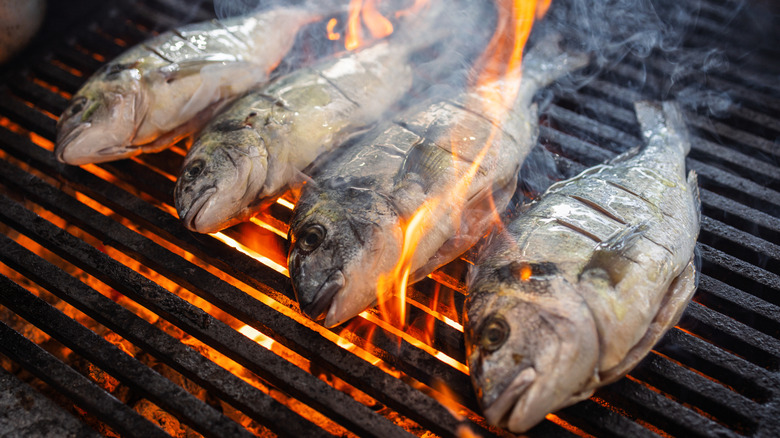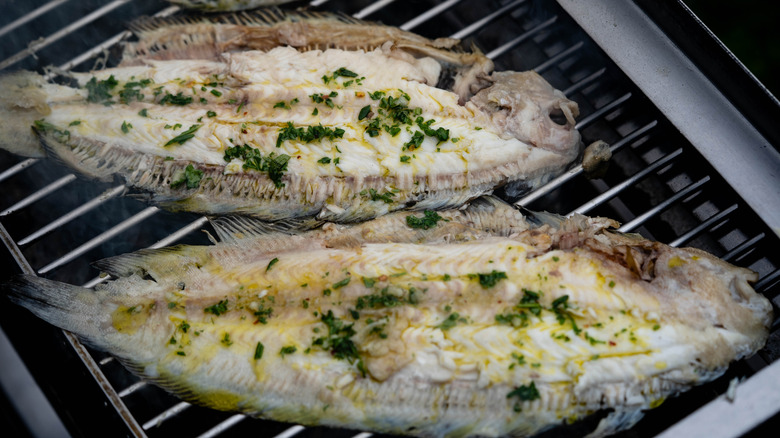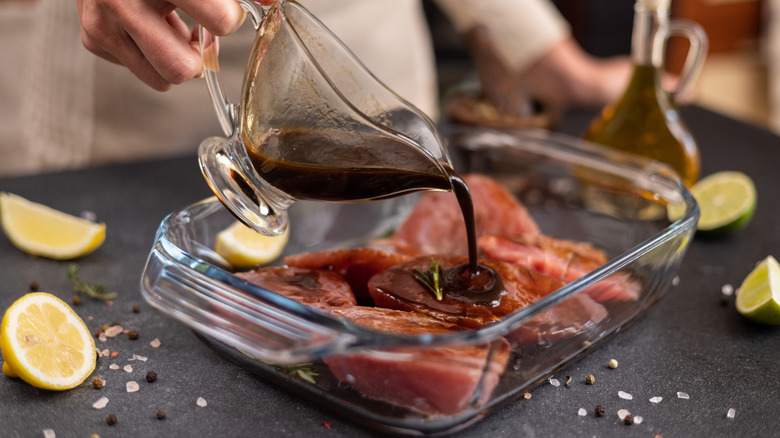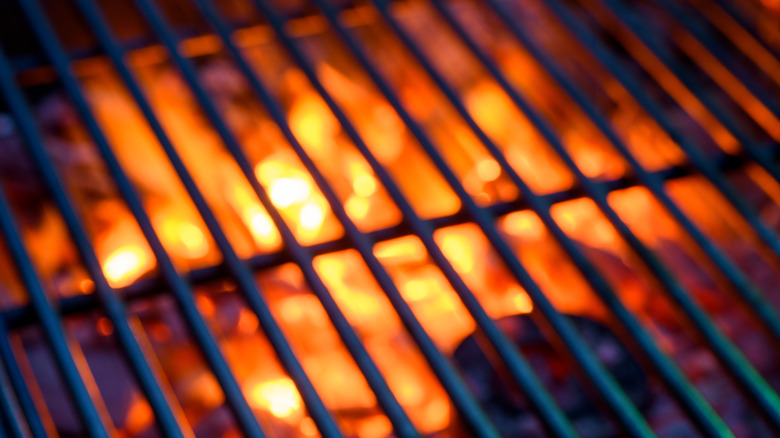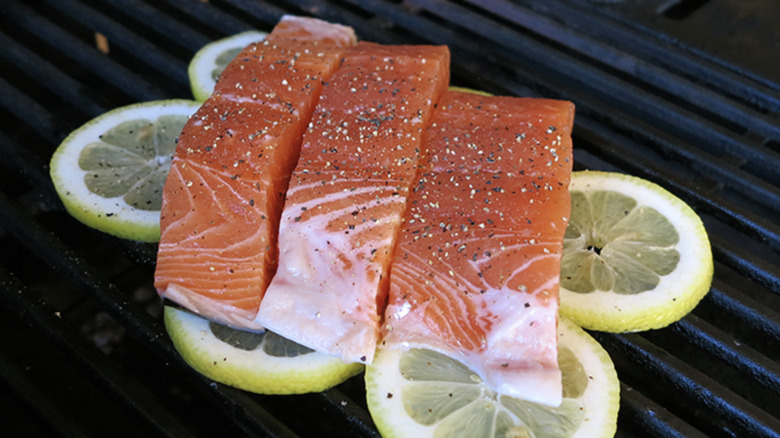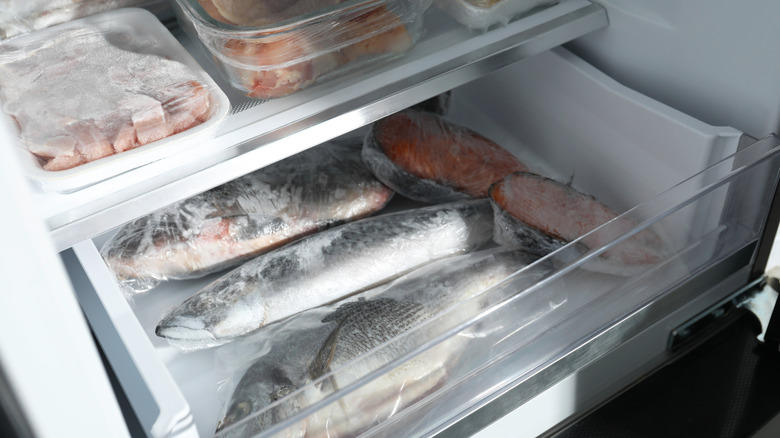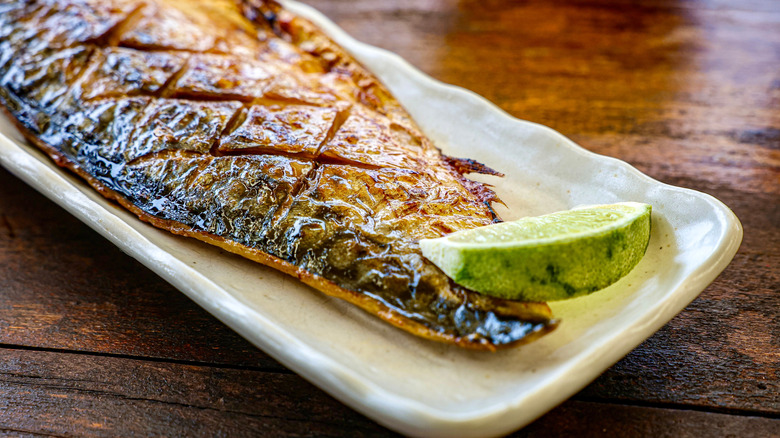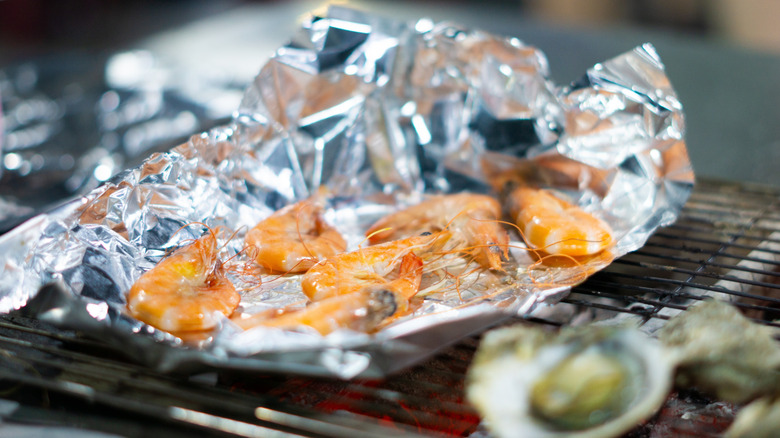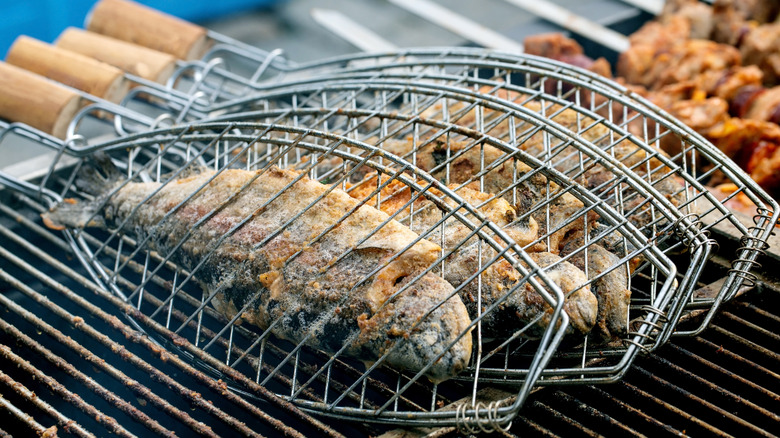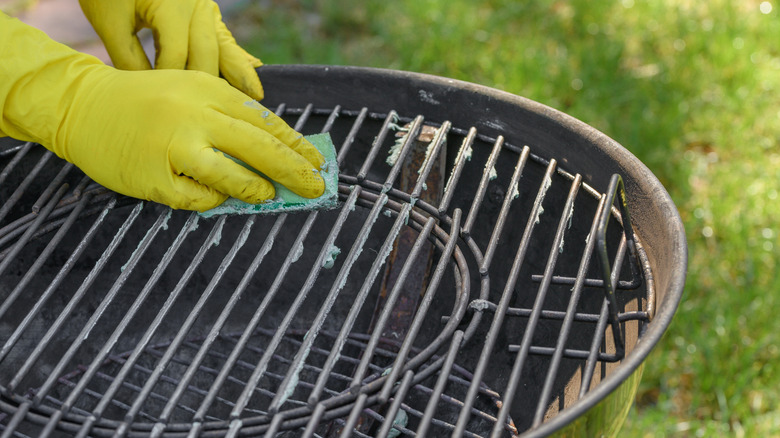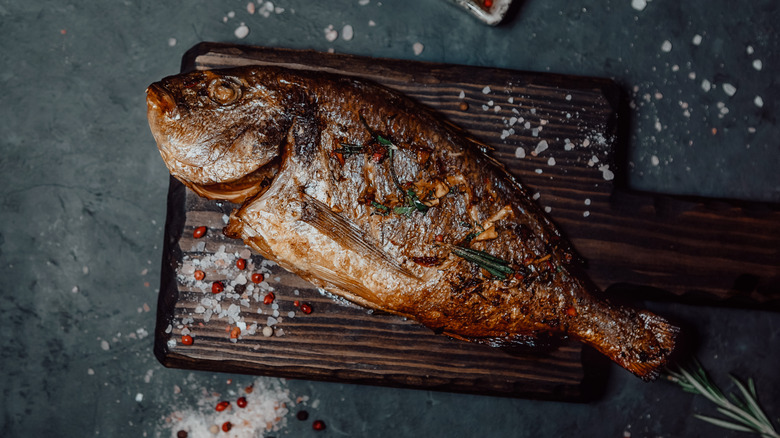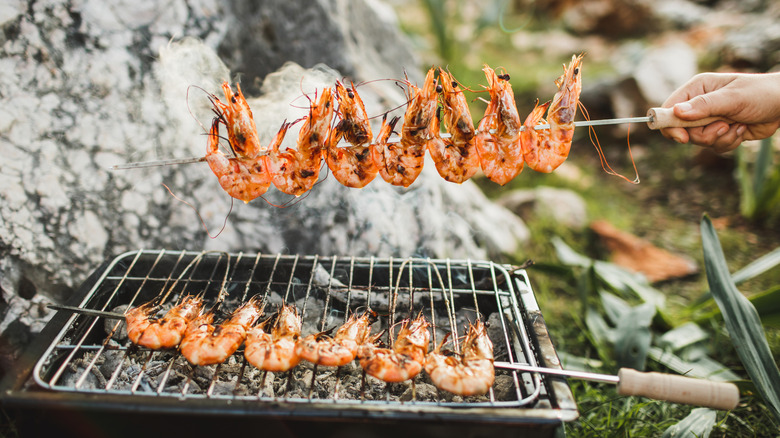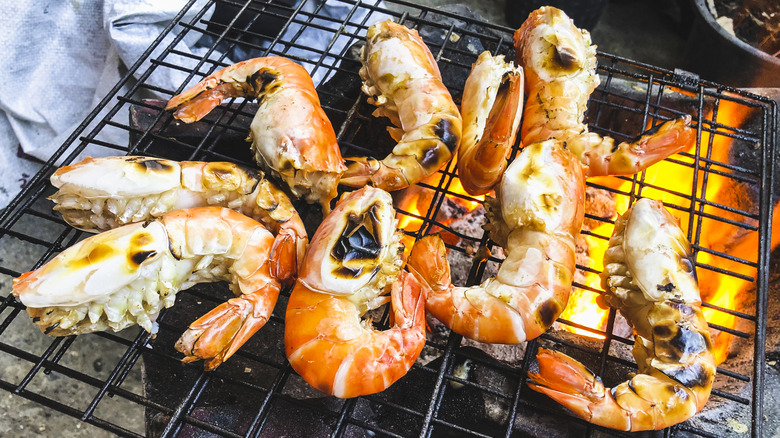12 Mistakes People Make When Grilling Seafood, According To Experts
Whether propane, charcoal, or gas, there is little doubt that firing up the grill is a great way of bringing friends and family together. And when it comes to grill-friendly fare, there are plenty of options other than just meat. Alongside sizzling cuts of steak, seafood is a classic favorite at summer cookouts. From fish to shrimp and squid, marine delicacies offer a flavorful, yet lighter, alternative or complement to meat-heavy meals.
While seafood is a common crowd-pleaser, grilling it can be tricky. Both fish and shellfish cook quickly, which means that they can easily become dry and rubbery. Some delicate seafood is prone to falling apart on the grill, if not handled correctly. Fishy delicacies can also stick to the grill grates, ruining both their flavor and presentation.
To help you get the most out of your next cookout, we consulted chefs and culinary experts about some of the top seafood grilling mistakes they have encountered during their careers. Read on to discover their tips on what to do — and what to avoid — next time you fire up the grill.
1. Using seafood that's not suitable for grilling
Not all seafood turns out well on the grill, with some fish being particularly prone to sticking to the grates, falling apart, or drying out if not handled properly. David "Chef Fig" Figueroa, the president, CCO, and co-founder of Melinda's Foods, doesn't recommend grilling flounder, sole, and speckled trout. "These are almost as flat as the spatula and as fragile as wet paper towels," he said. "Super flaky, thin, and quick to fall apart. I've personally lost a few speckled trout to the flames. It's not good when you can see fire through the filet."
Chef Fig suggests opting for sturdier fish varieties that hold their shape under high heat. "Try branzino, snapper, or grouper filets," he advised. "They're firm, flavorful, and built for the grill."
Grilling pre-cooked seafood is also a big no-no. This is because exposing it to direct heat a second time is likely to lead to dryness, toughness, or even a rubbery texture. Jim Foster, the owner of the Pelican Seafood Market & Grill, who has been a fishmonger for 40 years, says that one of the biggest grilling disasters he has ever seen involved cooked cocktail shrimp, which turned out as "tough as rubber." Instead, grill "good quality, saltwater shrimp," he suggested. "We love grilling wild Argentine butterflied shell-on shrimp. The shells get toasty and give the shrimp a special flavor."
2. Overmarinating and overseasoning seafood
Marinating and seasoning seafood can infuse it with bold and complex flavors, provided that the flavors you use aren't too intense. After all, we are looking to enhance the natural flavor of the fish and shellfish, not mask it. Many fish varieties have a subtle flavor that can be easily lost when they are smothered in overpowering sauces or seasonings.
Instead of using rich, complex mixtures, try filling the fish cavity with simple ingredients like herbs and fruit. Alternatively, brush the fish with an oil-based marinade infused with herbs, spices, and aromatics. This won't just add flavor to the fish, but also help crisp up its skin on the grill. Avoid water-based marinades when grilling seafood, as they can make it soggy.
If you opt to go down the marinade route, it's crucial not to leave your seafood in the mixture for too long. Most marinades contain acid — be it in the form of lime, lemon, or vinegar — which can "cook" the seafood before it even hits the grill grates. After all, it's citrus that gives ceviche its "cooked" texture. As a rule of thumb, don't marinate firm fish such as swordfish for longer than an hour and flaky fish like sea bass for more than half an hour. When marinating shrimp, aim for a maximum of 45 minutes.
3. Forgetting to preheat the grill and skipping the oil
Whether it's a succulent steak, a juicy burger patty, fish, or shellfish, preheating the grill is a simple step that goes a long way toward making your barbecue a success. Placing seafood on a cold or lukewarm grill can leave it dry and overcooked. In terms of presentation, seafood placed on a cool grill may not develop grill marks, which are often seen as a highly desirable finishing touch.
In addition, cooking seafood on a cool grill can make it stick to the grates, potentially causing it to tear when you try to pry it off the grill. There is a very good reason for this — grates that don't generate enough heat let seafood chemically bond with the metal.
Aside from not preheating the grill, failing to oil it is another reason you may find yourself struggling to remove seafood from the grates. Andy Papson, the executive chef at Virgin Hotels Dallas who specializes in seafood, is an advocate of properly greasing both the grill and the seafood. "One hack or trick is to spray the grill and fish with pan spray," he explained. "This will prevent the fish from sticking." He also advises cooks to use "a fish spatula instead of tongs. The tongs have a tendency of tearing the fish."
4. Failing to use citrus to stop fish from sticking to the grill
Few things mess up a barbecue faster than seafood that is impossible to remove from the grill grates. Not only does this often result in torn up fish and mangled squid and scallops, but it can also make the grill very difficult to clean. Luckily, there is an easy solution to this problem, provided that you select a reasonably firm fish — when grilling, it's always best to opt for meaty fish rather than delicate filets. Seafood is frequently paired with citrus, whether in a marinade or as a garnish. Why not take this a step further and grill the fish directly on lemon, lime, or orange slices? This makeshift barrier doesn't just protect the fish from direct flames, it also imparts it with a bright, zesty flavor.
This is the favorite grilling method of Jim Foster from the Pelican Seafood Market & Grill, who also recommends cooking fish with foil. "We love lining a tin foil sheet with thin slices of lemon and thinly cut leeks," he said. "Lay your fish on top," then add "salt and pepper and a splash of wine. Wrap up the foil and place on the BBQ at medium heat for 18 minutes."
5. Grilling seafood straight from frozen
If you can't get your hands on freshly-caught seafood, buying frozen options is the next best thing. This is because, more likely than not, the seafood you see at your local supermarket has already been frozen and defrosted. Fish and shellfish that are flash frozen immediately after they are caught present a much more appealing prospect — after all, they have been frozen at the peak of freshness. In addition, buying frozen fish gives you the ultimate control over the thawing process.
While some home chefs may tell you that it's perfectly acceptable to grill your seafood straight out of the freezer, many professionals tend to disagree. Trimell Hawkins, executive chef and culinary advisor at Current Backyard, hits the nail right on the head: "Frozen fish is the worst type of fish to grill," he said. "It tends to hold more water, so more must be done with it to grill [it] properly."
To thaw seafood, it's best to transfer it from the freezer to the refrigerator. This not only keeps it safe from harmful bacteria, but also means that the moisture is gradually reabsorbed into the fish as it thaws. Defrosting seafood too fast forces the moisture out of the protein, resulting in dry and bland-tasting shellfish or fish.
6. Removing the skin from fish before grilling
While many of us are used to eating skinless, pre-portioned fish filets, if you have the chance, grilling fish like salmon with the skin on can open up a whole new world of possibilities — that is, if you get the grilling process right. When prepared correctly, fish skin turns golden and crispy, providing a satisfying contrast to the soft and fleshy texture of the fish.
Aside from enhancing the eating experience, leaving the skin on the fish when grilling can also help keep it from falling apart during the cooking process — especially when you flip it or transfer it from the grill to the plate. The skin also acts as a natural barrier between the fish and the grill, keeping the seafood moist and tender.
For optimal results, opt for one of the fish types known for their tasty skin such as red snapper, trout, salmon, dorade, or black bass. Pat the skin dry with a paper towel or leave the fish skin-side-up in the refrigerator for about an hour — any extra moisture can result in a soggy, rather than crispy, skin. Always grill the fish skin-side-down to ensure that it ends up deliciously browned and crisp.
7. Forgetting to use foil packs when grilling more delicate and smaller seafood
There is little doubt that aluminum foil is an unsung hero of the kitchen. Often overlooked and underappreciated, kitchen foil prevents food from burning, helps lock in moisture, and makes clean-ups a breeze. It can also be very useful when grilling fish and shellfish. Not only does aluminum foil stop smaller seafood such as shrimp from falling in between the grates and help to keep delicate fish intact, it also conducts heat, allowing seafood to cook evenly. Last but not least, grilling seafood in an aluminum foil basket makes it easier to infuse it with herbs and aromatics.
Ashley Lonsdale, chef-in-residence at ButcherBox, is a huge fan of aluminum foil when grilling seafood. "Grilling fish in a foil packet makes even the most delicate varieties a great choice for the grill," she told us. "Packets allow the fish to steam, so it's advantageous to add a pat of butter or swirl of olive oil, fragrant aromatics like thyme, lemon slices, and scallions, and even vegetables like zucchini or sugar snap peas to steam alongside the fish."
8. Failing to use a grill basket or a cast iron grill plate
Consisting of wire grids that clamp together and create a "basket" that holds seafood in place, grill baskets are designed to stop fish from sticking to the grates or falling apart during the grilling process. Grill baskets also make flipping seafood a breeze, as all you have to do is use the built-in handle to turn the basket over on the other side.
According to David Rose, executive chef for Omaha Steaks, grill baskets are indispensable when cooking flaky fish. "I have noticed many people fail cooking white fish on the grill simply because of the lack of knowledge of how delicate the fish is and how prone it is to falling apart when grilling," he said. "I don't grill these fish for a reason! If I do, I add oil and use a fish basket to take away the possibility of the fish breaking."
Another kitchen accessory that can be a game-changer when grilling seafood is a cast iron grill plate. Ideal for promoting even heat distribution and stopping smaller pieces of seafood from dropping into the fire, grill plates can be placed directly over the grates. Chef Ashley from ButcherBox says that a cast iron grill plate can act as a safety net for flakier fish. "Heat it well before grilling the fish, at least five minutes, and oil it to prevent the fish from sticking," she suggested. "Use a blackening seasoning blend to add flavor and color."
9. Grilling seafood on dirty grates
Whether it's succulent seared juicy pork chops, steaks, bratwurst, or delicate seafood, grilling directly on dirty grates is a recipe for disaster. Seafood is much more prone to sticking to grates that haven't been cleaned, potentially leaving you with a fishy mess. The chunks of burnt food that adhere to the grill can also impart your food with flavors of past grilling sessions, and even stick to your fish and shellfish. Any leftover grime can also contaminate your food with harmful bacteria that can make you and your family sick.
To clean your grill properly, heat it for 10 to 15 minutes to loosen some of the food remnants that may be stuck to the grates. Once sufficiently hot, scrub the grill with a sturdy wire brush until the grates look clean and smooth. It's best to clean the grill grates between each use to prevent the buildup of grime and grease. To keep things in tip-top condition, it's also recommended to give the entire grill a deep clean every 12 months.
10. Overcooking or undercooking seafood and not letting it rest after grilling
The secret to getting your seafood just right lies in preheating the grill. Tossing fish and shellfish onto a cold grill extends their cooking time and may very well lead to overcooking and tough and dry seafood. As a rule of thumb, grill fish for approximately 10 minutes per each inch of meat — we are talking about thickness, not the surface area. This means that a fish that is one inch thick should be grilled for around five minutes per side.
Just like overcooking can ruin your seafood, undercooking can make it undesirable and potentially dangerous to eat since it can expose you to harmful bacteria. While grilling times vary depending on fish type, the protein is generally done when its center is no longer translucent and it can be easily broken apart with a fork. If you are cooking a larger and meatier fish, you can also use a meat thermometer to ensure it has reached the recommended internal temperature of 145 degrees Fahrenheit. Scallops and shrimp are considered done at a lower internal temperature of 120 degrees Fahrenheit.
Just like a good steak, seafood needs to rest for a few minutes after being taken off the grill. Leaving food on a plate allows the residual heat to finish the cooking process. It also gives the juices in the seafood time to be reabsorbed back into the flesh, improving the overall flavor and texture.
11. Never grilling seafood on skewers
Colorful and versatile, food skewers can make a visually striking addition to any dinner party. However, their appeal goes beyond just presentation. Skewers are perfect for grilling smaller seafood pieces that could otherwise fall through the grates into the flames, like shrimp and scallops. Additionally, skewers give you more control over the cooking process, as they can be easily turned and moved around the grill, giving the seafood even exposure to heat.
Skewers are made from different materials, each with their pros and cons. For instance, stainless steel skewers are durable and reusable but can get extremely hot. On the other hand, bamboo and wooden skewers are both cheap and disposable, but can catch on fire during grilling. To prevent this, soak the skewers in water for around 30 minutes before adding the seafood and placing them on the grill. For a convenient shortcut, soak a batch of skewers and freeze them to ensure that they are always on hand when you spark up the grill.
12. Overcrowding the grill
Whether you are grilling meat, veggies, seafood, or all of the above, it's important to give each item enough space to cook evenly. While it may be tempting to grill all of your seafood in one go, overcrowding the grill does more harm than good. This is because loading up the grates with too many items cools it down, leading to steaming rather than grilling. This, in turn, is likely to result in soggy seafood, instead of the crisp, charred texture and smoky flavor that make it so delicious. In addition, placing too much food on the grill won't leave you with enough room to create grill zones for direct and indirect cooking, increasing the risk of overcooking more delicate items.
It's best to space out each piece of seafood by a couple of inches. If the grill isn't large enough to accommodate all of your fish and shellfish, it's best to cook the food in batches. Some grilling experts recommend leaving around a third of the grill clear of food, so there is space to move food around quickly in case of unexpected flare-ups caused by dripping fats or marinades.
